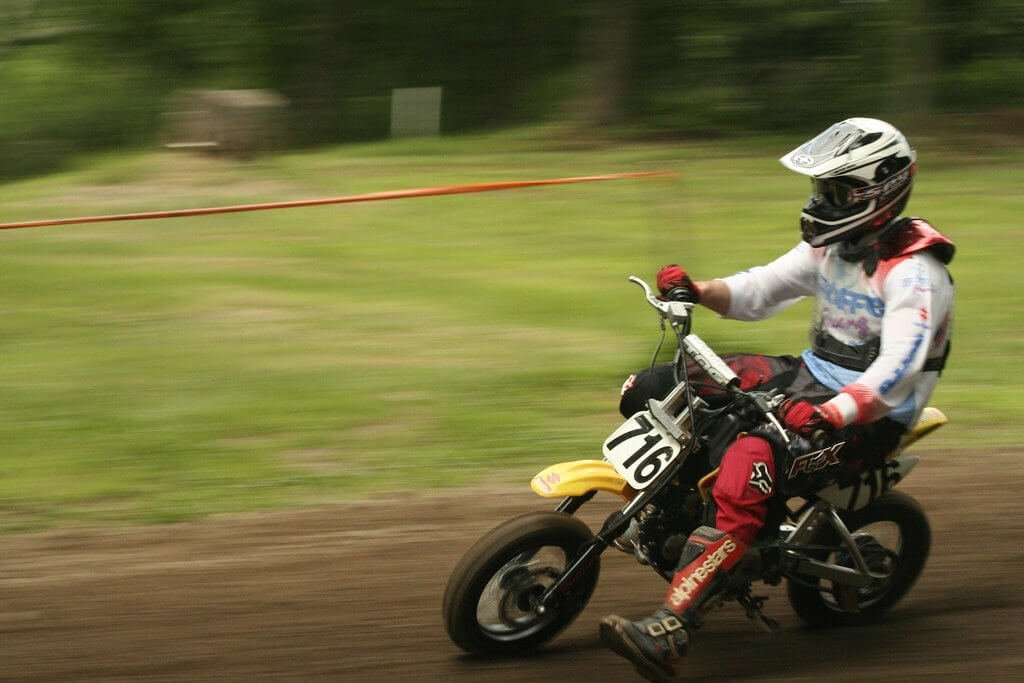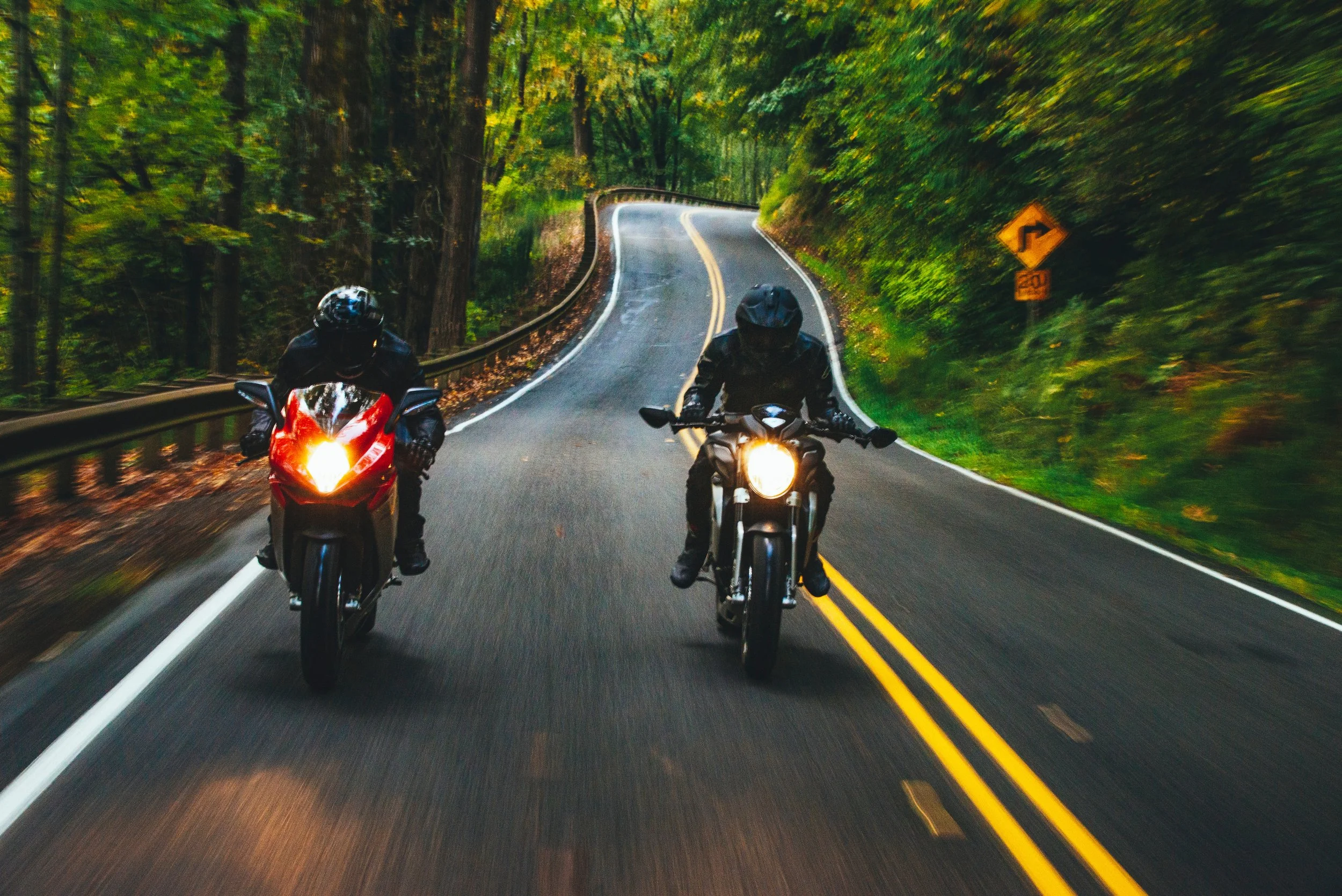Confession time: I, John McCoy, am not a motorcycle guy. Ok, there’s a little more to the story, so let’s back up to the summer of 2004. Yeah, I’m kinda old.
My grandfather-in-law had an old 1976 Honda GL1000. It was in good shape, and he offered to give it to me, so I accepted. At the time, I was in the Air Force, living in base housing, and to drive a motorcycle on base, you had to take a motorcycle safety course. During that course, the instructor told us it wasn’t a matter of if we would take a spill but when. That has always stuck with me.
"Pit Bike Races" by Darin House is licensed under CC BY 2.0.
Anyway, he took the bike back after his grandaughter divorced me, and I haven’t been on a bike since then. But sometimes, when I’m headed to Home Depot, a few bikes catch my eye, ripping down the main drag. They’re little tiny bikes, a little bigger than a pull-start mini-bike, but with all of a motorcycle's suspension, lights, and tag. They in no way appear to be mopeds, but they are only about half the size of a motorcycle.
It turns out these little badasses are pit bikes, and once I knew what to call them, my very next question was how to make one street legal because of course, it was.
A pit bike is a fun little missile that is ready for your next adventure if only you can make it street-legal.
Is A Pit Bike A Moped?
No, a pit bike is not a moped. A pit bike is a pit bike because pit bikes weren’t ever supposed to be on streets in the first place. Pit bikes are used in the racing pits so crew members can get to and from wherever they’re needed in a hurry.
Pit bikes are small, but not just in displacement; they are small in stature. But before we talk about what a moped is, we must clarify what a pit bike is.
First, a pit bike is not a legal designation in the eyes of the DMV, but they aren't mopeds in that context, either. A pit bike is different. It is small. Like, really small. They run between 50cc-150cc and have a much smaller frame, although externally, they appear to be a micro dirt bike clone.
This is a moped. This is NOT a pit bike.
Another key difference between a dirt bike and a pit bike is the armor level around their engines and drivetrains. Dirt bikes are made to take a beating; pit bikes are made to roll around the racing pits. Pit bikes aren’t beefy, and they’re made cheaply. But again, they’re not built to thrash trails.
And this fact could be a benefit. A pit bike is a dirt cheap way to get around town or the countryside if you’re on a budget (or just a cheapskate like me).
What Is A Moped, Then?
Mopeds are not motorcycles. The only things they really share in common with motorcycles are engines and two tires. Beyond that, there isn’t anything else in common.
The definition of a moped changes from state to state, but for the most part, it looks like this:
No more than 50cc.
No more than three brake horsepower.
A maximum of about 30mph on flat ground.
Pretty stunning performance, right?
Mopeds are good options if you live in a loft in Brooklyn. But beyond that, their use is limited in real-life applications.Is It A Motorcycle, Then?
Yes, a pit bike is a motorcycle. They definitely go over 30mph on flat ground, and there isn’t much use in staying at 50cc if you aren’t riding a moped. Also, pit bikes are equipped with a transmission, unlike mopeds which operate at a single speed. So go ahead and scrub the idea of a moped out of your mind; pit bikes are just small motorcycles.
All normal traffic rules will apply, along with the standard motorcycle equipment required by law in your area.
If It's A Pain To Title It, Why Bother?
The biggest issue is registering a motorcycle as street-legal when it wasn’t intended by the factory to be street-legal. Adding all of the required items to the bike isn’t all that hard. The problem is how your state views a vehicle that was made to be an OHV from the factory, especially if your state is strict on emissions.
But why shouldn’t you register it if you want to drive it on the roads? Pit bikes are fun, cool, and really cheap.
One of the things you may run into is your state wanting to title your pit bike as a moped or a scooter when it is, in fact, not a moped or a scooter. Why does this matter? Simple.
If your whip is registered and titled as a moped and you are pulled over for exceeding that 30mph threshold, you’re the one in the hot seat, not the DMV. Oh, and don’t forget the different licensure requirements; mopeds generally do not require a motorcycle endorsement on your license, but motorcycles obviously do.
In other words, if you want to ride your pit bike as a cheap motorcycle, don’t accept your state labeling it as a moped because you will be the one who takes it in the shorts at inspection.
"Luther with his bike in a pit of mud" by Kai Hendry is licensed under CC BY 2.0.
What Parts Do I Need To Make A Pit Bike Street Legal?
So, since pit bikes are built as OHVs, they usually don’t come equipped with any lights or horns. Thankfully, it’s not too hard to find street-legal light kits for a pit bike.
In most cases, a pit bike must be equipped with the following items to be considered street-legal:
White headlight with low and high beam
Red taillight with brighter or separate brake light
Reflectors: yellow front and rear
White license plate light
Front and rear turn signals
DOT tires
Mirrors
Horn
Quiet exhaust with muffler
Is That All I Need to Do?
Well, that depends on exactly how you're getting street-legal. If you walk into your local DMV, they might be unable to make it happen. Some states have obscure requirements, like a minimum CC for something to be registered as a motorcycle. Other states won't outright say anything until the inspection happens, at which time they will fail the bike based on the visual fact that it's a pit bike. In other words, you could go through a lot of trouble and still come out empty-handed.
Dirt Legal does it differently. We work with a few states we know will title and register OHVs, including pit bikes. That's right; we can make your pit bike street legal - guaranteed or your money back.
Your pit bike won’t need to be inspected with our program, so there's no risk of failing at that step. Just keep in mind that if you get pulled over without the required parts, it’s your butt on the line
Oh, and did we mention that we can do mini-bikes too? Yeah, that’s right. Your 5hp, pull-start minibike can roll down Rodeo Drive if you should choose.
You’ll also need insurance. Most insurance companies struggle with anything outside the norm, like a street legal pit bike. Regular insurance companies don't have a clue what to do with that, and we know that from experience. We’ve spent the better part of a decade finding the best insurance companies that know their stuff – check them out on our Insurance page along with some helpful advice for making your calls with insurance go as smoothly as possible.
What If My Home State Sees It As A Moped - Or Won't Register It At All?
Again, dweeby moped as opposed to cool pit bike 😎
Dealing with DMV gets finicky really quickly if you are tagging anything outside of, ya know, a Honda Accord (or a Honda Shadow for our bike riders). Once you start getting in the realm of OHVs, it can get pretty dicey, especially in the states that are hard to deal with about everything. You know who you are.
That’s ok. We’re your one-stop shop for titling your dirt, pit, trials, e-bike, or mini-bike! We can help you get it on the road if it's two wheels and an engine.
On top of the roadblocks you could run into with your DMV, you still have to go in and deal with them.
Not with Dirt Legal. We do all of the leg work, so you don’t have to. And that’s a pretty good deal, isn’t it?
It’s what we do. We believe that you should be able to drive just about anything you want to, and pit bikes are no exception.
The Dirt Legal Advantage
Dirt Legal is your solution to the problems nagging at you. You’ve got vehicles that you need to get street-legal but can’t. This is where we come in. We know the ropes, so you don’t have to.
All you need to do is provide us with the requested information, and we’ll take care of the rest.
If you are ready to get your pit bike out of the garage and on the road, check out our dirt bike titling and registration program.
Also, if you have any other vehicles needing titles taken care of or prefer not to spend thousands on sales tax, check out our Montana LLC program!








Motorcycle accidents account for a disproportionate percentage of traffic fatalities and serious injuries. The dangers are real, and the importance of safety cannot be overstated.